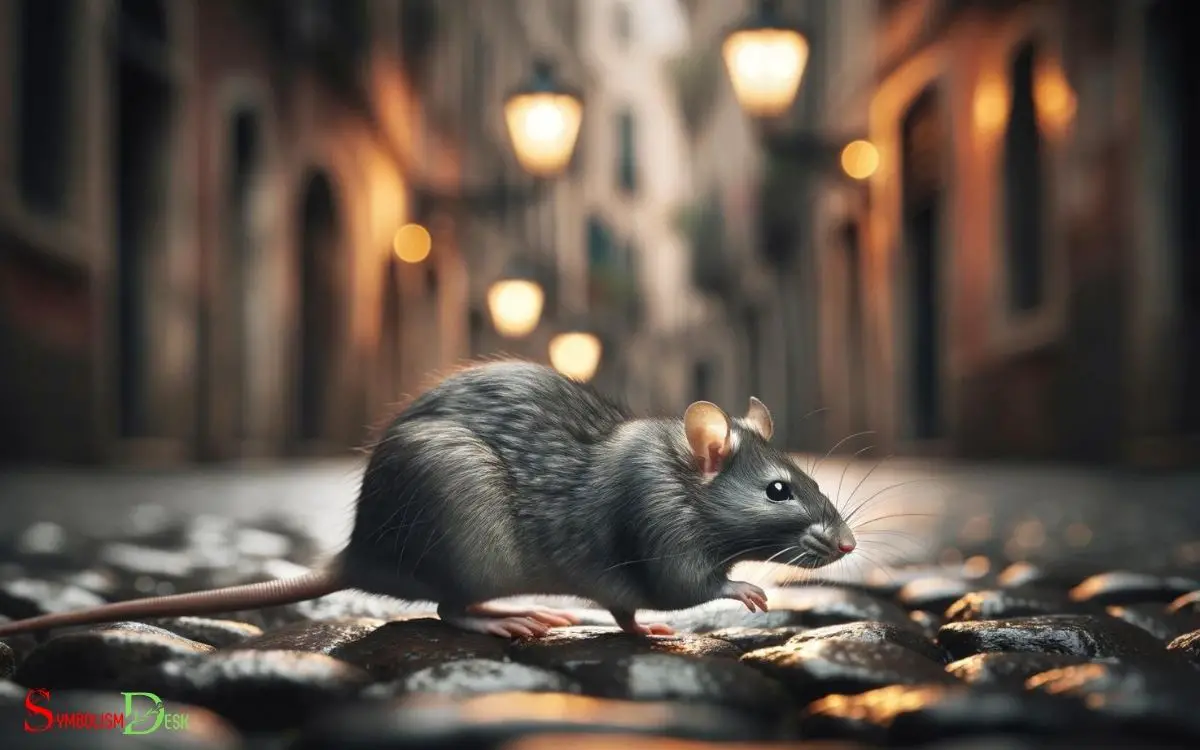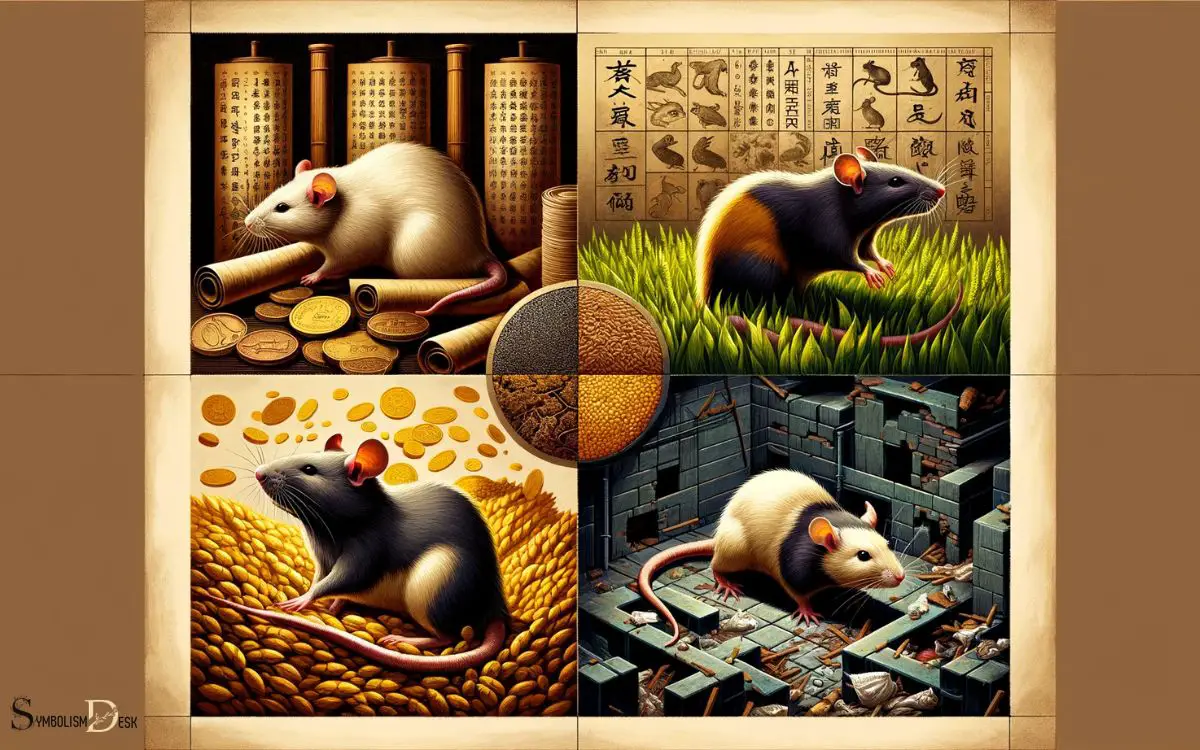What Is the Symbolic Meaning of a Rat? Intelligence!
The rat is a complex symbol with a wide array of meanings across different cultures, often representing adaptability, survival, intelligence, and sometimes negative connotations such as disease or stealth.
The symbolic meaning of a rat varies:
- Resourcefulness and Survival: Rats are known for their ability to thrive in various environments and situations.
- Intelligence and Cunning: They are also seen as intelligent creatures, able to solve problems and navigate mazes.
- Negative Associations: In some cultures, rats are associated with disease or seen as omens of death or misfortune.
- Cultural Significance: In Chinese zodiac, the rat is a symbol of wealth and surplus.
- Duality: The rat’s symbolism shows the dual nature of cultural perceptions, where it can be both revered and reviled.
Rats, embodying duality, spark both admiration and fear, symbolizing the thin line between survival and destruction.

Key Takeaway
Cultural Interpretations of Rats

Cultural interpretations of rats vary widely across different societies and historical periods. In some cultures, rats are seen as symbols of wealth and prosperity, while in others, they’re associated with filth and disease.
For example, in Chinese culture, the rat is one of the 12 zodiac animals and is considered a sign of wealth and surplus. On the contrary, in many Western societies, rats are often viewed as carriers of disease and are associated with uncleanliness.
These differing views stem from varying experiences with rats in different environments and historical contexts.
Understanding these cultural interpretations is crucial in comprehending the symbolic significance of rats in various societies.
This understanding sets the stage for exploring the fascinating realm of rats in mythology and folklore.
Rats in Mythology and Folklore

Rats’ presence in mythology and folklore reflects diverse cultural beliefs and stories about their significance. In various cultures, rats have been portrayed as both positive and negative symbols, often embodying different attributes and meanings.
Some key points to consider include:
Positive Depictions
- In Hindu mythology, the rat is associated with the god Ganesha, symbolizing wisdom and intelligence.
- In Chinese folklore, the rat is one of the twelve zodiac animals and is seen as a symbol of wealth and surplus.
Negative Depictions
- In European folklore, rats are often associated with death and decay, appearing as harbingers of plague and disease.
- In African mythology, rats are sometimes depicted as cunning tricksters, using their intelligence to deceive others.
These contrasting representations demonstrate the complexity of rats’ symbolic significance across different cultural narratives.
Rats as Symbols of Resourcefulness

Rats have long been admired for their resourcefulness, adaptability, and survival skills. In many cultures, they’re seen as symbols of finding opportunity in adversity and thriving in challenging environments.
The ability of rats to make the most of their surroundings and make use of whatever resources are available makes them powerful symbols of resourcefulness.
Adaptability and Survival Skills
Rats demonstrate remarkable adaptability and survival skills, making them powerful symbols of resourcefulness. In the face of changing environments and scarce resources, rats exhibit impressive abilities to thrive and survive.
They’re adept at finding food and shelter in various conditions, showcasing their resourcefulness in the wild and urban settings alike.
This adaptability allows them to navigate through challenges and overcome obstacles, making them an example of resilience and quick thinking.
Rats can also adapt their behavior to avoid predators and outsmart traps, highlighting their clever and strategic approach to survival.
Their ability to thrive in diverse conditions and their quick thinking in the face of danger make them powerful symbols of resourcefulness and adaptability.
Resourcefulness in Challenging Environments
In challenging environments, such as urban settings or the wild, rats showcase remarkable resourcefulness and adaptability.
They navigate through obstacles with resilience and quick thinking. Rats are adept at finding food, shelter, and water in diverse and often hostile environments.
They can locate alternative food sources, gnaw through barriers, and build complex burrow systems for protection.
Their ability to thrive in various conditions highlights their resourcefulness in the face of adversity. Rats symbolize the importance of adaptability and quick problem-solving, traits that are valuable for survival in challenging circumstances.
By observing rats’ resourcefulness, humans can gain insights into effective strategies for overcoming obstacles and finding innovative solutions in their own lives.
Finding Opportunity in Adversity
Navigating through challenging environments, rats exemplify resourcefulness and adaptability, embodying the ability to find opportunities in adversity.
- Adaptability: Rats can thrive in various habitats, from urban areas to rural settings, showcasing their ability to adapt to different circumstances.
- Survival Instinct: Their knack for survival enables them to find sustenance and shelter even in the harshest conditions.
Rats’ resourcefulness is evident in their ability to make the best of unfavorable situations, symbolizing the potential for growth and success amidst adversity.
This adaptability and resilience make them powerful symbols of hope and opportunity in the face of hardship, a concept that transcends the negative connotations often associated with these creatures.
Transitioning into the subsequent section about ‘the dark and negative symbolism of rats’, it becomes evident that rats are multifaceted symbols with diverse meanings.
The Dark and Negative Symbolism of Rats

Many people associate a number of negative connotations with the symbolism of rats. Rats are often seen as carriers of diseases and pests, infesting homes and spreading filth. This negative association has led to rats being symbolic of decay, destruction, and uncleanliness.
In some cultures, rats are even associated with betrayal and cunning, due to their ability to sneak into places unnoticed. The dark symbolism of rats is also depicted in literature and mythology, where they’re often portrayed as sinister creatures that bring about misfortune and chaos.
These negative traits have contributed to the fear and disgust that many people feel towards rats. Despite their negative symbolism, rats also hold a place in popular culture.
Rats in Popular Culture
Rats’ presence in popular culture reinforces their symbolic associations with cunning, deceit, and disease. In literature and film, rats are often depicted as sneaky and untrustworthy characters, perpetuating their negative connotations.
Additionally, rats are frequently used as symbols of filth and contamination, further emphasizing their association with disease and decay.
Some notable examples of rats in popular culture include the character Templeton in E.B. White’s ‘Charlotte’s Web’ and the depiction of rats as carriers of the Bubonic Plague in historical accounts.
Furthermore, rats have been featured in numerous horror movies, where they embody fear and revulsion. These cultural representations contribute to the enduring perception of rats as carriers of danger and treachery, shaping public attitudes towards these creatures.
This negative portrayal of rats as symbols of danger and treachery leads seamlessly into the subsequent section about ‘rats as omens and superstitions’.
Rats as Omens and Superstitions
Continuing from the portrayal of rats as symbols of danger and treachery in popular culture, they’re often regarded as omens and the subject of various superstitions.
In many cultures, seeing a rat is considered a bad omen, signaling impending misfortune or danger. In some superstitions, rats are associated with disease and filth, and their presence is believed to bring illness or disaster.
On the other hand, some cultures view rats as symbols of prosperity and fertility, especially in matters of wealth and abundance.
Additionally, there are superstitions related to the behavior of rats, such as the belief that their movements or sounds can foretell future events.
These superstitions reflect the complex and varied symbolic meanings attributed to rats across different societies and traditions.
Conclusion
The symbolic meaning of a rat is complex and varied. It represents resourcefulness and survival, but it can also have negative connotations in different cultural contexts. The symbolic meaning of a rat often differs depending on perspectives, being revered in some traditions for its cleverness while despised in others as a harbinger of disease. Similarly, the symbolic meaning of an ant carries its own intricacies, often associated with diligence, teamwork, and perseverance. Together, these creatures highlight the diverse ways that animals can embody profound lessons and traits in human storytelling and cultural beliefs.
Moreover, the symbolic significance of rats weaves through human history and culture. Like a clever rat navigating through a maze, it leaves a lasting impression on our collective consciousness.






